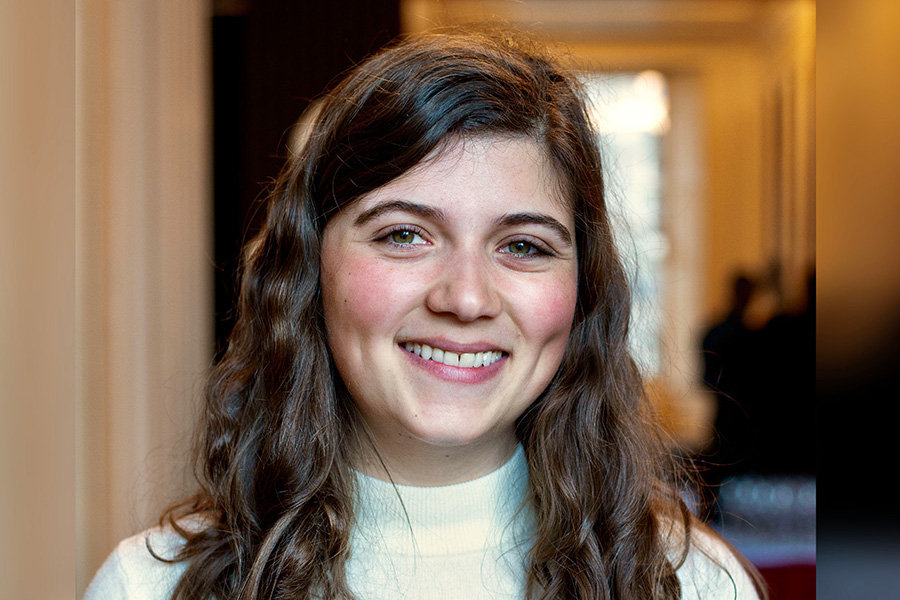Alumni Spotlight: Beatrice Dain

Beatrice Dain graduated from Florida State University in 2021 with a bachelor’s degree, from the Department of Anthropology, part of the College of Arts and Sciences, and the International Affairs program, part of the College of Social Science and Public Policy. While at FSU, Dain earned a Fulbright U.S. Student Program scholarship that allowed her to study in Northern Ireland as well as an FSU IDEA grant for her research on the Hebrew Immigrant Aid Society, a Jewish American nonprofit providing assistance to refugees. Dain recently started a position with the U.S. Citizenship and Immigration Services, an agency within the Department of Homeland Security as an asylum officer.
Tell us about your background, where you are from and what brought you to FSU.
I’m originally from Gainesville, Florida, and knew FSU had great liberal arts programs. I learned about the Exploration and Discovery Learning Community, a group of students with similar majors living in the same dorm, and knew I wanted to join to make new friends and receive support.
Tell us about your recent work for the Migration Policy Institute, an independent, nonpartisan institute seeking to improve immigration and integration policies.
As an international affairs consultant, I worked on two main projects. One project focused on different ports of entry, aiming to anticipate what security technology ports will utilize. My other project looked at complementary refugee resettlement pathways, investigating the role of employers in hiring highly skilled refugees in various countries.
What inspired you to pursue degrees in anthropology and international affairs?
When I started at FSU, I was an exploratory major unsure of my career aspirations. My international affairs passion came from my experiences living abroad, including spending my junior year of high school abroad in Germany through the Congress-Bundestag Youth Exchange Program. I added anthropology as a major after interviewing families of missing migrants for the Colibrí Center for Human Rights. I've always been fascinated with people and cultures, so these majors seemed like a great fit.
In 2020, you received an FSU IDEA Grant. Tell us how you used this grant to aid your honors thesis on the Hebrew Immigrant Aid Society.
My mentor and honors thesis adviser Kurt Piehler, associate professor of history and director of the Institute on World War II and the Human Experience, suggested I apply for the IDEA grant. My thesis examined how the HIAS resettled refugees to Latin America before, during and after World War II. Due to the pandemic, I reviewed scanned documents from home rather than in New York where the HIAS collection is located. Scanning documents gets expensive quickly, but the grant allowed me to pay those fees and continue my research.
I'm also thrilled to have presented this research recently at the Alan B. and Charna Larkin Symposium on the U.S. Presidency, The Holocaust, and The State of Israel symposium held at Florida Atlantic University. It’s been over three years since I received the IDEA grant, which shows IDEA grants can come full circle in students’ professional careers.
Tell us about the Fulbright U.S. Student Program scholarship you received in 2021.
I applied for this Fulbright scholarship through FSU’s Office of National Fellowships. This allowed me to earn my master’s degree in Belfast, Northern Ireland, in the U.K., studying how borders function and are perceived by locals and visitors. Northern Ireland has a complex border and history. Despite reaching a peace agreement in 1998, the effects of conflict are still felt, making Northern Ireland a great place to study borders and security.
Tell us about your experience working as a WWII archive assistant for the Institute on World War II and the Human Experience.
As an archive assistant, I held artifacts and documents that are often only seen in museum display cases. Kurt Piehler, Mike Kasper, an archivist for the institute, and Anne Marsh, the institute’s administrative assistant, supported me and made sure I felt welcome in this position. This experience, facilitated by the FSU Career Center and InternFSU, was a true highlight of my undergraduate studies.
Tell us about the course you created to aid Nicaraguan artisans and your experiences with the Undergraduate Research Opportunity Program at FSU.
UROP was my introduction to research at FSU. I worked with a doctoral student to create a course to help Nicaraguan artisans sell their goods internationally via Etsy. I mainly drafted interview questions for this project, and I was lucky enough to travel to Nicaragua to interview artisans directly.
Tell us about your experiences traveling abroad during college.
The summer after my freshman year, I studied abroad in Germany to study German language and European Union politics. It was great returning to Germany, seeing my old host family and reconnecting with my high school study abroad friends.
During my sophomore year, I went to Antigua, Guatemala, a beautiful town surrounded by volcanoes, to study human rights and Spanish. I participated in internships and experiences unique to the location.
Tell me about working as a Missing Migrant Project intern in 2019 for the Colibrí Center for Human Rights.
My time at the Colibrí Center was my first experience working with an organization focused on migration to the United States. The Colibrí Center was created to help families file missing person reports for migrants who went missing while crossing the U.S.-Mexico border. As an intern, I interviewed families and wrote missing person reports to help identify individuals found in the Sonoran Desert. These were tough conversations, but the experience opened my eyes to how U.S. border policy and migration pathways intersect.
Even though you may miss FSU, what are you looking forward to now?
I just started a new job with as an asylum officer at USCIS through the Presidential Management Fellows Program. In this role, I'll be interviewing asylum seekers and making eligibility determinations. I'm excited to receive an education on U.S. asylum practices and learn how the U.S. interprets this law.
